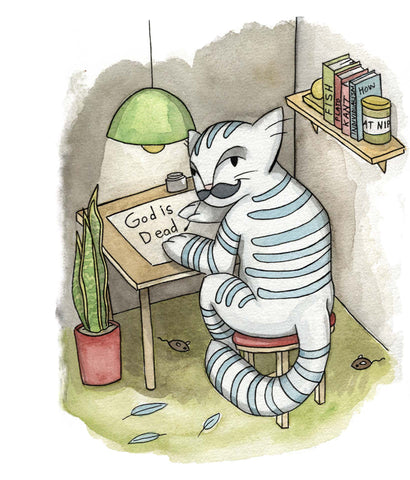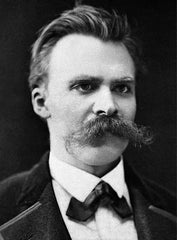Nietzsche Cat + God is Dead: What’s that about?
Share
One of my most popular prints and stickers is Nietzsche Cat. It pictures a mustached-cat looking at us over his shoulder; he has just written “God is Dead” on a paper in front of him. On a bookshelf by his head we see books labeled “Kant” and “Individualism,” as well as a jar of catnip.

If we take this statement at face value, “God is Dead,” there is a real sense of irony: god is dead and here we have a cat making the announcement. The cats have taken over our internet and now they are taking our religion, too. The may be deities, after all.
But art can rarely be taken at face value, philosophy even less so. And this actually is a portrait of Friedrich Nietzsche as a cat. He is credited with the phrase “God is Dead” (though like most other things, it is a lot more complicated than that).
Rather than seeing this phrase as a scandalous statement of anti-theism (which by some accounts, it is, but maybe not the way you think), I see this as an observation of deep changes in human society during the Enlightenment period of the 18th century. This was a time of rapid industrialization and scientific discovery: both of these things fundamentally changed the way we look at god.
After the Enlightenment, the Western ideas that we held about god were no longer relevant. Because of science and technology, the old idea of god was no longer true. In essence, human development had killed the god of the past and now we are on our own. If we consider that all of our experiences of god are held through our narrow human perceptions, we can see that our ideas, philosophies, and beliefs are constructs to begin with.

God is dead. God remains dead. And we have killed him. How shall we comfort ourselves, the murderers of all murderers? What was holiest and mightiest of all that the world has yet owned has bled to death under our knives: who will wipe this blood off us? What water is there for us to clean ourselves? What festivals of atonement, what sacred games shall we have to invent? Is not the greatness of this deed too great for us? Must we ourselves not become gods simply to appear worthy of it? — Nietzsche, The Gay Science, Section 125, tr. Walter Kaufmann

